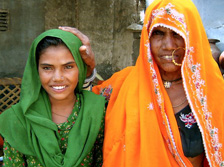
Neeraj and her mother Devki from Wide Angle’s Back to School |
“What’s so great about being educated,” asks Devki, a mother from Rajasthan, India whose daughter Neeraj appears in Wide Angle’s film Time For School. “Even if you study, these educated people have nothing to do….We educated our sons and what good has it done?”
While there was a time when Devki’s words rang true and India could ignore the needs of the poor, in today’s economy, India can’t afford to leave anyone behind. India’s growing infrastructure has spawned the need for economic advancement for its people, and now the government is working to help achieve that goal.
This month, after a three-year wait, the Indian Union Cabinet passed the long-pending Right to Education Bill, paving the way for free and compulsory education for children between the ages of 6 and 14. By declaring education a fundamental right, the bill makes providing free, compulsory education a legally enforceable duty of Indian states. This revolutionary piece of legislation aims to change education in India by setting minimum standards for both public and private schools. For example, the legislation sets a pupil-teacher ratio of 40:1.
“Education is a long-term investment,” said Montek Singh Ahluwalia, the deputy chairman of the Planning Commission and the Indian government’s top policy czar. “We have neglected it, in my view quite criminally, for an enormously long period of time.”
Currently, India accounts for 20 percent of the world’s out-of-school children. Out of 200 million children aged 6-14 years, 59 million children are not attending school. Of this, 35 million are girls and 24 million boys.
While there are more Indian children in schools than ever before, the quality of public schools is low. Among children in fifth grade, 4 out of 10 could not read at the second grade level, and 7 out of 10 could not subtract. Government schools are almost exclusively for children from the poorest families. However this new bill includes a clause that requires all private schools to reserve 25 percent of their seats for poor children from the neighborhood.
Lata Vaidyanthan, a school principal, is skeptical. “Laws and bills don’t make children go to schools, Vaidyanthan says. “Initially there will be problems because while everyone must understand their social responsibility, what matters is whether the right children will have access to come to this program?”
The bill still faces one more hurdle; it has been cleared by the cabinet, but will now be introduced in Parliament. If it’s not passed before the end of the current election season, the next government will have to introduce it again from scratch.
